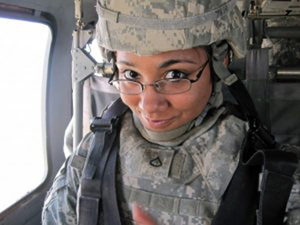No End in Sight for a Family’s Agonizing Guessing Game
Relatives of a paratrooper fear they will never know why the 19-year-old woman was stabbed to death, even though one Army court-martial has been held and another is about to begin.A young paratrooper’s relatives fear they will never know why she was stabbed to death.
Jumping out of high-flying aircraft isn’t how most 19-year-old women get their kicks, but for Morganne McBeth that was one of the joyous things in her young life. “She loved it. She’d tell us, ‘You are in a totally different universe,’ and this was fun for her,” her step mother, Sylvia McBeth of Fredericksburg, Va., said of the Army paratrooper. Morganne’s brother, Army Sgt. Christopher McBeth, 28, who has completed two tours in Iraq, added, “She lived for this.”
Morganne had always been patriotic — once she colored strands of her long black hair red, white and blue — and she was smart, friendly, gregarious and popular, so it wasn’t a surprise when she ended up in the 82nd Airborne as a paramedic and quickly made friends throughout her military company.
The thrill of training as a paratrooper ended when McBeth’s 1st Brigade Special Troops Battalion, 82nd Airborne of Fort Bragg, N.C., was deployed to Iraq in the summer of 2009. These specialty troops — paramedics, drivers, secretaries — suddenly found themselves enclosed within the desolate Al-Asad air base in northwestern Iraq.

The battalion made it through its 12-month tour relatively unscathed, and some of its soldiers, including McBeth, were scheduled to be sent home. Energized and relieved, she posted this on her Facebook page:
“Back to the land where we are surrounded by people we love and love us the same. Enjoying the sweet smell of rain and the relaxing sounds of birds chirping in the morning. Vast lands to explore — it’s going be great and it’s going be soon.” As people her age sometimes do, McBeth ended the note with a smiley face.
Within seven days of writing that post, and just a handful of days before she was to come home, she was dead.
She died on the early morning of July 2, 2010, on an operating table as military doctors tried desperately to save her from a stab wound that started just below her right collarbone and went down into a lung and her heart.
Soon, the Army declared the death “noncombat related” and essentially closed the case, saying it was the result of an accident. But for the McBeths, there was no closure. They pressed for justice, and eventually arrests were made. However, those arrests did little to satisfy the family, which believes that the Army has been covering up a more serious crime by undertaking prosecutions of lesser charges. The killing of Spc. Morganne McBeth was no accident, her relatives say. On the basis of the limited evidence that they have, they see the Army’s version of what happened as farfetched, and some familiar with the case — even some Army people — agree with that conclusion.
Relatives say that trying to answer the question of what, exactly, happened to McBeth has become a guessing game that gnaws at them day and night because military investigators from the Army’s Criminal Investigative Command, known as the CID, which investigates all noncombat deaths, have offered so little information. And in the course of revealing those few facts, the investigators have managed to increasingly confuse and anger the family.
The family says the military has turned its back on them, a complaint often heard from those coping with the noncombat death of a military member. “The military told us they were going to do right by Morganne; they told us this many times,” lamented Sylvia McBeth. The McBeths say that an Army casualty assistance officer, a woman, tried to pry more information out of the CID but after several months suddenly said she could no longer help them.
McBeth was a female soldier during a decade of war when more and more women were joining the military, and the military embraced and promoted her. The Army selected her to appear on an Armed Forces Network “Faces of Freedom” broadcast just weeks before she died. Fighting back tears as she addressed family and friends, she said: “Can’t wait to get back to you guys, I miss you.”
Morganne McBeth spent her last night alive in the company of two friends — Army Spc. Tyler Cain, 22, a truck driver, and Spc. Nicholas Bailey, 24, a military police officer.
Nearly a dozen soldiers from their unit told this writer that McBeth, Cain and Bailey were good friends, and that McBeth and Cain had become a romantic couple, their feelings for each other expressed for all to see on Facebook. The McBeth family, however, says Morganne told them in the weeks before she was to return home that she intended to distance herself from Cain because he “was not right.”
“The relationship [was] off — she wanted it off,” said Sylvia McBeth.
Over the months, the Army allegedly presented a series of differing explanations of what happened in Spc. McBeth’s final hours of life. Initially, the McBeths say, the Army CID claimed Morganne had accidentally stabbed herself and then, the family says, it shifted to suggesting she had committed suicide. Sylvia McBeth believes that Morganne was not a person who would have killed herself, and certainly would not have put herself in a position to be stabbed with a knife during horseplay with comrades, as the Army later claimed: “She attended a Christian school. We live our life to ourselves. She wasn’t allowed to play with knives and she wasn’t brought up to play with knives.”
The Army’s ever-changing story did nothing to bring the McBeths to reconcile themselves to the loss of a loved one and then move on. They sought help outside the military last November, turning to their congressman, Rep. Rob Wittman, R-Va. Within seven days of meeting with Wittman — and five long months after the death — the two soldiers who had been with Morganne at the time of the stabbing were arrested and criminally charged.This development was a surprise to the family. Sylvia said the McBeths learned of the arrests and charges through the media, not through the Army. “To me, this is playing out like from some movie scene or something. It’s crazy,” she told a reporter in late 2010. She went on to say the family was still in the dark about the facts of Morganne’s death, adding, “We are kind of happy that they are being charged, but we are still disappointed.”
At that point, Bailey was charged with involuntary manslaughter, obstruction of justice, conspiring to obstruct justice by giving false statements and making a false official statement. Cain was charged with conspiring to obstruct justice by giving false statements and giving false statements. Later the Army made one of the charges against Bailey more severe after Cain admitted that his first account of the fatal night was not accurate.
Cain and Bailey first told investigators that the three were hanging out in a vacant tent throwing four-inch knives at a poster pinned to the tent’s thin synthetic fabric and foam lining and when Bailey yanked a knife out of the tent he pulled so hard he accidentally spun around and plunged it into McBeth. But, according to prosecutors, in a fourth statement that Cain gave, the specialist changed his story: He claimed that Bailey, instead of losing control of his motion when yanking the knife from the tent, had been wildly brandishing the knife, struck a wall and then accidentally stuck the blade into McBeth when he turned around. The Army elevated the main charge against Bailey from involuntary manslaughter to negligent homicide. Even so, that more serious charge, like the first one, carries the possibility of a far lighter sentence than murder, which would require that the prosecution prove malicious intent.
The McBeth family and Morganne’s friends, especially those outside the military, scoff at the Army’s acceptance of a claim that she was horribly, deeply stabbed by accident as she and two friends were goofing off, and they are repelled by the sentence that Cain received when he was found guilty at Fort Bragg this past spring on charges of obstruction and giving false statements — 45 days in the brig and a reduction in rank. Those grieving for McBeth were stunned by what they saw as a slap on the wrist for Cain, and as Bailey’s September court-martial approaches they say the military cannot be trusted to see that justice is done.
The McBeths point to the report of a paramedic who tried to save Morganne. Louis Vega, an emergency responder and contractor for the Defense Department who helped rush McBeth to the main hospital at Al-Asad, told military investigators that the dying woman, in some of her last words, told him there had been an altercation. There is no published record of Vega ever saying that McBeth told him what had caused the “scuffle” — the word used in the first sentence of one of the articles of a North Carolina newspaper that is following the case. If indeed there was a physical conflict in the moments before the stabbing, doubt is cast on all the accounts by Cain and Bailey.
It stands to reason that Vega would be a key witness in legal proceedings stemming from the death. But after he was scheduled to testify during Cain and Bailey’s Article 32 hearings — hearings that determine whether court-martials go forward — he never showed up. The Army prosecution team told the court that Vega was not available to testify. The Fayetteville, N.C., Observer reported that Vega “could not be reached … because he was on a Carnival cruise ship.”
Sylvia McBeth said in an interview that when she asked the CID why Vega did not testify, she was told the Army had no power to bring the civilian to the hearings; the Army added that he was on vacation, she said. The writer of this Truthdig article made numerous attempts to reach Vega, but no correspondence was ever returned.
During the Article 32 proceedings, the prosecution’s contention that the stab wound was accidentally inflicted came under a barrage of skepticism from at least one military investigator and at least one Army surgeon.
Army CID Special Agent David Miller, who investigated the case, stated during one of the hearings, “I couldn’t reconcile pulling a knife out of that wall [made of foam and fabric] and losing your balance to the point that you take a knife with a 3½ [to] 4-inch blade literally to stab someone all the way to the hilt of the knife. Those sequences happening, they didn’t make sense.”
McBeth’s wound also didn’t appear accidental to someone who had a firsthand look at it — the surgeon who tried to save McBeth’s life. Maj. David Lynn told the military courtroom that he worked for several hours fighting “overwhelming blood loss,” adding that the wound was much deeper than a typical accidental stabbing. “In accidental stab wound, the moment a person [holding a knife] feels resistance, human nature is to back off, and that reflex is lightning quick,” he said.
This reporter tried to interview Lynn, but the colonel of Lynn’s unit, the 21st Combat Support Hospital of Fort Hood, Texas, said he would not allow the doctor to talk about the matter. Morganne McBeth’s family and friends have only memories these days. On Facebook, they share pictures and videos of the girl they knew as uncomplicated and selfless. “She was very artistic with her looks and she was always upbeat,” said one Virginia friend, Chelsea Ruffin. “If you were feeling down and she was in the room, she would take whatever she was doing in her life and put it aside, and try to help you get through what you needed to get through. I don’t remember a single day without seeing a smile on her face. There was not a mean bone in her body. She was a really good girl. No drugs, no drinking. She wasn’t the partying type. The only thing that made her crazy [manic] was sugar. When she had some sweets she would make people laugh until their stomach hurt.”
Struggling under what she sees as a blanket of resistance from the Army, Sylvia McBeth remains among the countless parents who have lost children in the military and must live with a never-ending question: Just what happened to my kid?
She doubts the truth will ever come out if that depends on the word of Morganne’s friend Tyler Cain, who has admitted he initially did not give an honest account of what happened that night in the tent.
“He lied. … This boy lied to us, and this is not right by Morganne,” she says.
Your support matters…Independent journalism is under threat and overshadowed by heavily funded mainstream media.
You can help level the playing field. Become a member.
Your tax-deductible contribution keeps us digging beneath the headlines to give you thought-provoking, investigative reporting and analysis that unearths what's really happening- without compromise.
Give today to support our courageous, independent journalists.






You need to be a supporter to comment.
There are currently no responses to this article.
Be the first to respond.